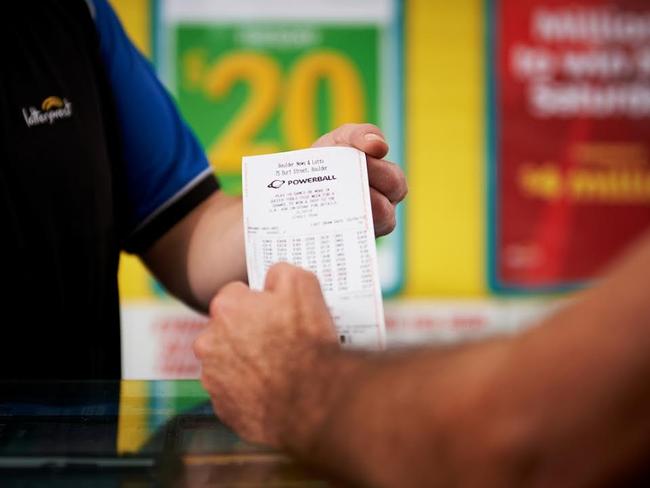Would you make off with your mates’ millions? Expert says Powerball brawl not surprising
THINK legging it with $16m of your mates’ winnings is crazy? This sort of thing actually happens all the time, and in the same situation, you might do the same.
IT seems unimaginable, but running off with millions of dollars that rightfully belong to some of your closest friends is apparently something many of us are capable of.
The case of Geelong man Gary Baron — who allegedly made off with a $16.7 million lottery win that was supposed to be shared between 14 colleagues — has shocked not only those who the money supposedly belongs to, but thousands of followers of what has now become a national news story.
The tight-lipped winner has gone to ground after allegedly buying two Powerball tickets, one for himself and one for his workplace syndicate.
The suspected millionaire has now admitted he won the cash, but is sticking to the story his winnings came from the ticket he bought for himself, and not the one intended for the group, 7 News reports. The case goes to court on Thursday.
It appears to be a brazen act, but according to one psychology and gambling expert, if you give us a shot at a few million bucks, many would probably do the same.

Professor Alex Blaszczynski has studied gambling and the psychology of money and relationships, and says it all comes down to how we feel about loss.
“With the advantage that somebody suddenly has when they obtain a large windfall, there becomes this reluctance to share it,” the Sydney University psychologist says.
“You see it in situations where people put in standard numbers over a number of years in a lottery and they go on holidays and there numbers come up, that is significantly aversive and the failure to take action there has led to a loss.
“In a syndicate situation, suddenly you have to take action to reduce the amount of reward that you get. There’s this sense of resentment and cognitive regret, and reluctance to part with what you have.”
Professor Blaszczynski says when money enters the equation and greed takes over, some people have difficulty taking into account ethical, moral and social considerations.
“If you win $100 and you’ve got to share it between four other people, then you frame it in the reference of not that I’ve won $25, rather that I’ve lost $75. If you win $10m, then that obviously plays out on a larger scale. You start thinking rather how life-changing it is to lose $9m than it would be to win $1m,” he says.
“Friendship tends to take second place.”

News.com.au has spoken to a number of people who claim to have found themselves in similar situations to the Powerball 14.
A Perth woman told of her parents’ anguish at losing not only what they believe was a significant amount of cash, but some of their closest friends.
“It wasn’t an official syndicate, but there were four couples, really close family friends, the parents were all friends and us kids had been close since kindy,” she says.
“They would buy a lotto ticket every week or so and after they bought their last one, that couple apparently moved to Queensland and no one ever heard from them again.”
The 26-year-old said her parents were reluctant to take action or pin the blame on their former friends because “they can’t prove anything”, though they grew suspicious when they heard the couple’s property portfolio started to expand significantly.
Buying two properties for each of their children and funding an overseas trip for another, plus hearing of their new life in a Queensland mansion irked the couple, but they were also disappointed by the sudden loss of contact and what they saw as a massive betrayal.
Another man told of a group of colleagues at an Army Base who allegedly won thousands claimed on a photocopied ticket.
“Like many they had a syndicate where something similar happened, although the person involved was still in their mist but they didn’t know who it was,” he told news.com.au.
“All members received a copy of the purchased ticket, but when the signatory went to claim their winnings someone else with a photo copy had already claimed.”
It should be noted Tatts, the gaming company that runs Powerball, advises against both setting up personal syndicates and photocopying tickets. Their guidelines for entry can be viewed here.

Professor Blaszczynski was unsurprised to hear these stories and said cases like these are probably a lot more common than we think.
“I don’t think it’s necessarily limited to lottery winners,” he says.
“You see it with families where there’s arguments over sharing of business ventures, sharing profits or deceased estate where people fight over the will, and in divorces.”
Professors Blaszczynski said while it was easy to pass judgment, acquiring a great deal of money and developing a fear of loss can easily take over.
“Quite often if you're placed in that particular situation then other factors come in,” he says.
“I think there’s a larger percentage of people who are unaware something like this has occurred to them.”




